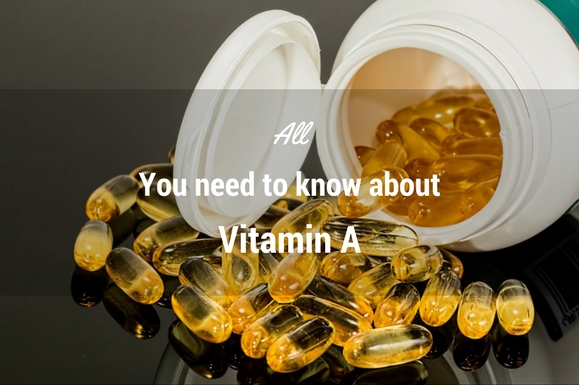Vitamin A, a fat soluble vitamin, has multiple functions: it is important for growth and development, for the maintenance of the immune system and good vision. As it is fat soluble it has to be consumed with fat for optimal absorption in the body. Vitamin A also functions as retinoic acid, which is an important hormone-like growth factor for epithelial and other cells. High vitamin A foods include sweet potatoes, carrots, dark leafy greens, winter squashes, lettuce, dried apricots, cantaloupe, bell peppers, fish, liver, and tropical fruits.
Contents
Physiological Functions of Vitamin A
Physiological function of Vitamin A has been found in maintenance of vision, bone growth, skin and mucosal integrity, spermatogenesis. Vitamin A also plays a very important role in protection against cataracts, atherosclerosis, macular degeneration and cancer.
Deficiency of Vitamin A
Deficiencies of vitamin A occurs due to an:
- Inadequate diets (with food carrying Vitamin A)
- Excessive alcohol intake
- Gastrointestinal conditions with diarrhea or fat malabsorption
- Intake of insufficient protein, energy and zinc leading to inadequate retinol binding synthes
Health Concerns due to Vitamin A Deficiency: Hypovitanminosis A
- Severe vitamin A deficiency leads to xerophthalmia, the most common cause of blindness in young children.
- Anorexia, growth retardation, recurrent infections, obstruction and enlargement of hair follicles, keratiniziation of skin epithelial cells and microcytic anemia.
- Increased risk of mortality
Assessment of Vitamin A Status
Measurement of functional vitamin A status through the measurement of serum vitamin A concentration
Serum retinol levels
Serum retinol levels
Serum Retinol levels between 30 and 60: Increasing liver stores of Vitamin A
Serum Retinol levels above 150pg/dl: Excessive liver stores of Vitamin A
Supplementation of Vitamin A
Adult: On an average 5000 – 10000 IU per day for 90 days
Best or Most Bio-available Supplement of Vitamin A
Buffered Vitamin A, Coenzyme A (CoA)
Dietary Sources of Vitamin A
High vitamin A foods include sweet potatoes, carrots, dark leafy greens, winter squashes, lettuce, dried apricots, cantaloupe, bell peppers, fish, liver, and tropical fruits. Dietary sources of Vitamin A are:
- Liver and fish oils
- Milk
- Eggs
- Leafy green vegetables
- Orange and yellow vegetables
- Tomato products
- Fruits
- Vegetable oils
- Carrot
- Broccoli
- Cantaloupe
- Squash


